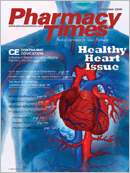Publication
Article
Pharmacy Times
The Heart of the Matter: Diabetes and CVD Risk
Author(s):
Cardiovascular disease (CVD) isconsidered to be one of themajor complications associatedwith diabetes and the leading cause ofmorbidity and mortality among diabeticpatients.1 Death due to CVD or strokeaffects at least 65% of individuals withdiabetes.1,2 Furthermore, when comparedwith nondiabetics, adults with diabeteshave two-to fourfold higher ratesof CVD, because many individuals withtype 2 diabetes have increased rates ofhypertension, obesity, and dyslipidemia.2Fifty percent of patients have evidenceof CVD at the time they are diagnosedwith type 2 diabetes.3 Statistics indicatethat 97% of adults with type 2 diabeteshave ≥1 lipid abnormalities, and ~70% ofdiabetics have some degree of hypertension.1
With effective patient education andcounseling, patients with diabetes canobtain the information necessary toimplement strategies to successfullymanage their condition. Thus, they canreduce or prevent the progression ofCV complications, as well as the othercomplications associated with uncontrolleddiabetes.
Increasing Awareness
Because pharmacists typically arecharacterized as among the most accessiblehealth care professionals, they arein a pivotal position to increase awarenessof diabetes and to educate diabetiesabout the importance of managingtheir disease. An excellent counselingtool to employ when advising patientsabout diabetes and CVD risks was developedby the National Diabetes EducationProgram. It is commonly referred to asBe Smart About Your Heart: Control theABCs of Diabetes. This mnemonic deviceenables patients to easily remember thekey components for optimal managementof their diabetes (Table).1,4
Another initiative to raise awarenessabout the connection between diabetesand CVD is a collaborative effort betweenthe American Diabetes Association (ADA)and the American College of Cardiology.This initiative is known as Make the Link!Diabetes, Heart Disease and Stroke.5 Thisprogram provides pertinent informationfor both patients and health care professionalsabout reducing CV risks.
Most recently, in June 2006, a jointeffort between the ADA and theAmerican Heart Association was announced.This effort urges health careproviders to enhance methods of evaluatingand reducing risk factors for CVDand diabetes.6 More information onthese programs can be found at the Websites of these organizations (see box).
Patient Education
When counseling patients with diabetesabout CV risks, it is important forpharmacists to evaluate the patients'current diabetes care plan, as well as toascertain their knowledge of CVD andtheir awareness of their own individualrisk factors. It also is important for thepharmacist to utilize counseling strategiesthat do not overwhelm patients, butrather empower them to effectivelymanage their diabetes.
Pharmacists can educate patients withpertinent information about their prescribedpharmacologic therapy, in conjunctionwith reinforcing the variousmeans of minimizing their CV risks, suchas the following:
- Adhering to medication therapy
- Maintaining optimal blood glucoselevels by routine testing
- Routine monitoring of blood pressureas well as lipid profiles
- Adhering to lifestyle modificationssuch as diet, exercise, and maintaininga healthy weight
- Avoidance of smoking, becausesmoking in diabetics doubles an individual'sCV risk
- Scheduling regular visits with a physician
- Practicing good oral hygiene
Pharmacists also can encourage patientsto discuss concerns with theirphysician (eg, whether they are candidatesfor aspirin therapy to reduce CVD).
Clinical studies have shown that controlof blood glucose, blood pressure, andlipid levels can significantly decrease anindividual's risk for CVD. It is the responsibilityof all health care professionals toensure that diabetics are aware of theconnection between CVD and diabetes.Combating a disease such as diabetesrequires a multifaceted approach.Through effective patient education,health care professionals may have a significantinfluence in reducing or preventingthe progression of CV complicationsin the diabetic patient.
Furthermore, pharmacists can positivelyimpact patient outcomes by assuringdiabetic patients that, although diabetesis a serious condition, it can be effectivelymanaged if they remain committed toall aspects of their treatment plan. Inaddition to counseling diabetic patientsabout their medications, pharmacists canbe a valuable asset in the management ofdiabetes by routinely asking patientsabout their blood glucose levels and bymaking recommendations to physiciansabout therapeutic alternatives that mayoptimize patient outcomes.
Ms. Terrie is a clinical pharmacywriter based in Haymarket,Va.
For a list of references, send a stamped,self-addressed envelope to: ReferencesDepartment, Attn. A. Rybovic, PharmacyTimes, Ascend Media Healthcare, 103 CollegeRoad East, Princeton, NJ 08540; or send ane-mail request to: [email protected].

Newsletter
Stay informed on drug updates, treatment guidelines, and pharmacy practice trends—subscribe to Pharmacy Times for weekly clinical insights.






